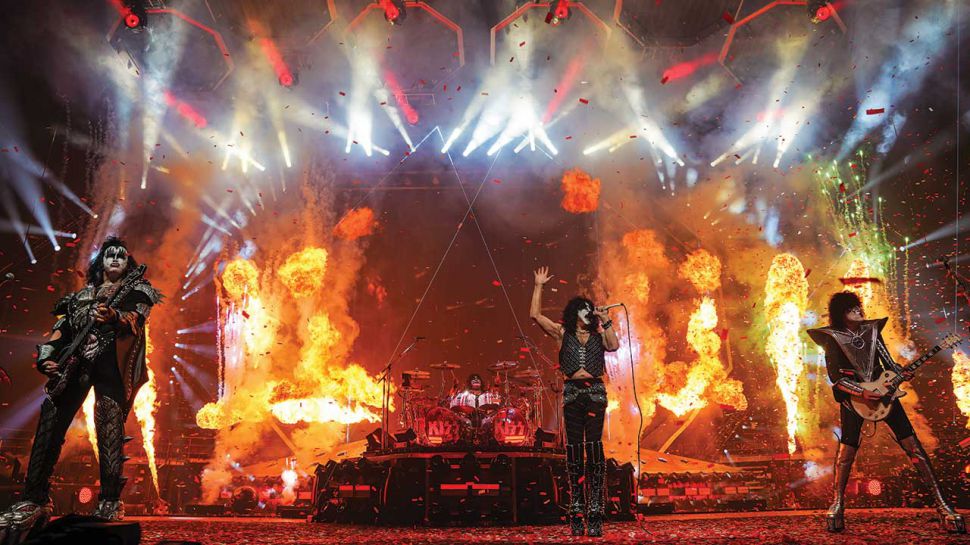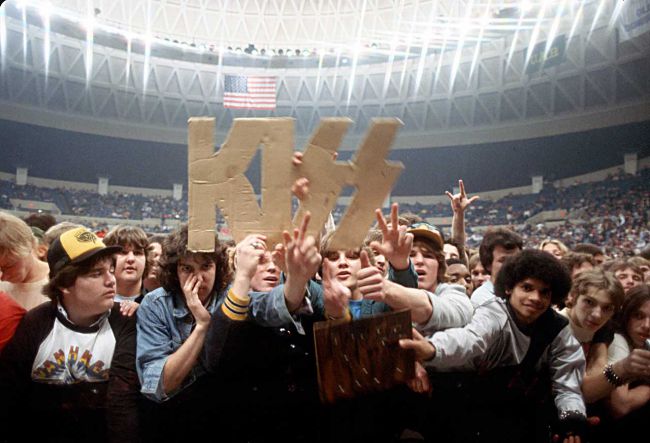Entertainment One
|
|

Entertainment One
|
|
Classic Rock

Iggy Pop claimed that he killed the 60s, but it turned out it was four semi-normal guys right off the streets of New York who really drove the final stake through heart of the peace-and-love decade nearly 46 years ago.
Gene Simmons, a former elementary school teacher; Paul Stanley, a cab driver with a heart-shaped face; Peter Criss, a sometime butcher and itinerant drummer who studied under the mighty Gene Krupa; and Ace Frehley, a gang member-cum-liquor delivery man. They stormed out of a $40-a-month fourth-floor walk-up in New York’s Chinatown in their six-inch platforms and sweaty black leather looking like four beasts disgorged from the underworld, and unleashed an unholy and entirely masculine creed of sex, braggadocio, innuendo and conquest, all delivered at a screeching 110 decibels and addressing every young man’s fantasies.
 While the band’s message has changed over the years (they’ve become more family-friendly and forswear any cursing during the show), they still attract legions of foot soldiers into the Kiss Army – even now, when they’re calling it quits in one final tour they’ve dubbed the End Of The Road. (They’ve attempted to trademark the term with the US Patent office to prevent any other retiring bands from using it. Good luck with that.) So far, 44 shows have been played in North America, with another 25-date run beginning in August. The European leg begins next week, and there are plans to extend the tour until, probably, mid-2020.
While the band’s message has changed over the years (they’ve become more family-friendly and forswear any cursing during the show), they still attract legions of foot soldiers into the Kiss Army – even now, when they’re calling it quits in one final tour they’ve dubbed the End Of The Road. (They’ve attempted to trademark the term with the US Patent office to prevent any other retiring bands from using it. Good luck with that.) So far, 44 shows have been played in North America, with another 25-date run beginning in August. The European leg begins next week, and there are plans to extend the tour until, probably, mid-2020.
Back at the beginning, the band were fuelled by high ambition, an unrelenting will, a prodigious work ethic and only the most rudimentary of musical talents. But they not only changed the face of musical history by painting it in Stein’s Clown White, they also kicked off their own brand of revolution, putting music back in the hands of the ordinary people and turning it back into a populist manifesto, picking up where Grand Funk Railroad left off by knocking rock music off of its lofty perch, stripping it of its perfect hair, wrecked cool and tight velvet stovepipe pants.
Blabbermouth
KISS frontman Paul Stanley spoke to KTLA 5 Morning News about the band’s “End Of The Road” farewell tour, which kicked off in January and is expected to last for three years.
Asked what his definition of “farewell” is, Stanley said (see video below): “Well, it’s the end of the road, in the sense that we’ve spent 45-plus years touring. And as glorious as it is doing two hours on stage and playing for sold-out houses, really it takes its toll, whether it’s my two torn shoulders that have been repaired, or my bicep tendons, or my knees. I wear them proudly as battle scars.
“I think it’s time,” he continued. “The show that we’re doing right now is the biggest thing we’ve ever done. It’s just state of the art. We’ve done 44 shows so far, all of them sold out, played to half a million people, and we’re just getting started, actually. It’s a big world.”
Asked whether he still spends time practicing his guitar playing, Stanley said: “I’m on stage so much of the time, and we’re playing so often that there’s really no need. But when we rehearse, like for the ‘End Of The Road’ tour that we’re on, we spent about three months rehearsing. Now, we’ve been playing these songs for 45-plus years, but there’s a difference between playing them and really synchronizing, and that synchronicity, that comes from rehearsing. So, we took this very seriously. We wanted the band to be in top form, and if we’re gonna call it quits, it’s great to do it when everybody loves each other rather than everybody’s not talking or the band is on the decline. It seems like the right time for a victory lap, and that’s what we’re doing.”
As most fans remember, back in 2000 and 2001, KISS already performed a “Farewell Tour”. The trek, which was the last to feature drummer Peter Criss, played 142 shows over five legs, covering North America, Japan, and Australia. Stanley later said that the 2000 tour was nothing more than an attempt by the group to “put KISS out of its misery” after years of ego clashes and disagreements over songwriting credits between the band’s original members. Continue reading
Micheal Brandvold